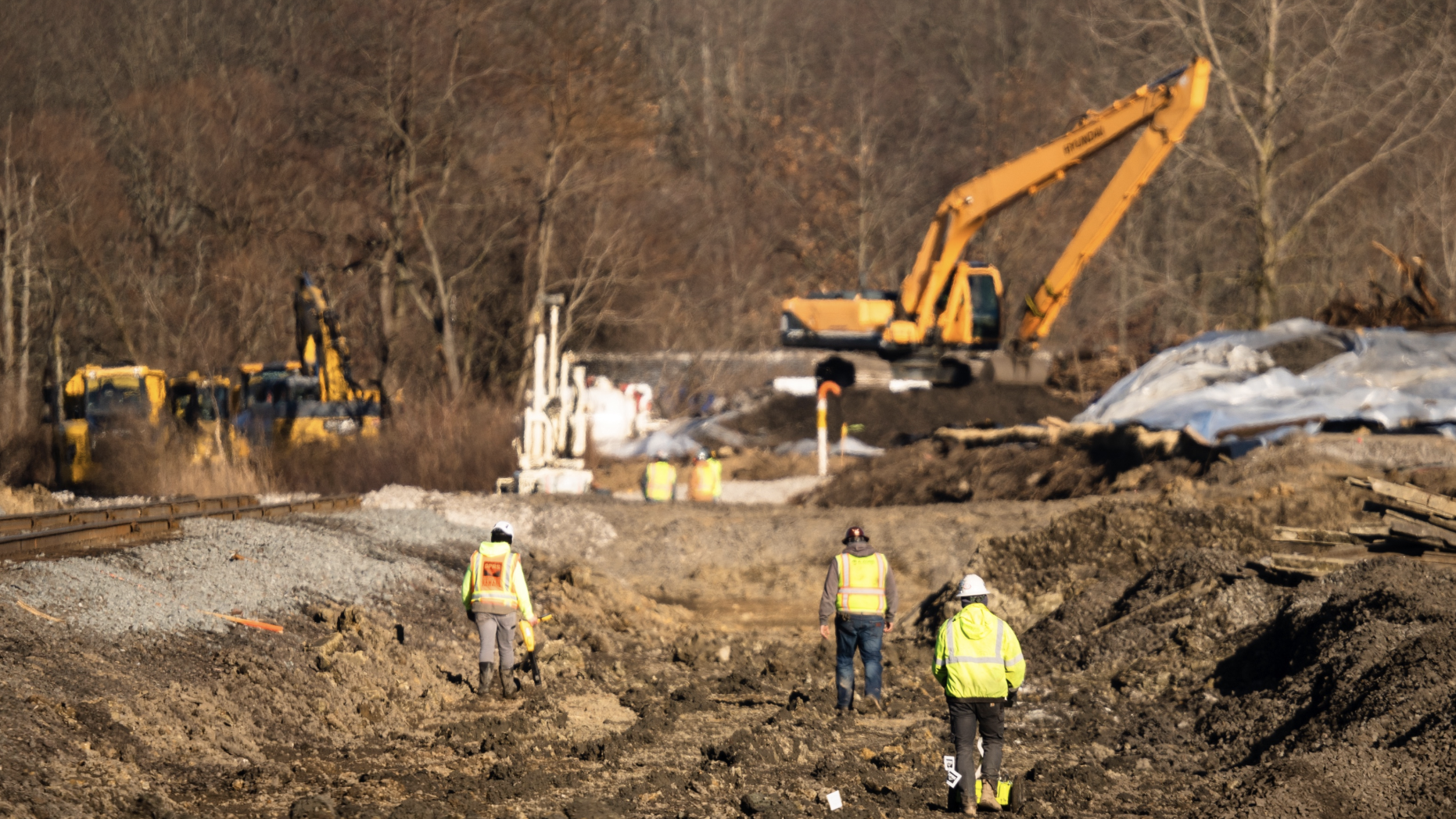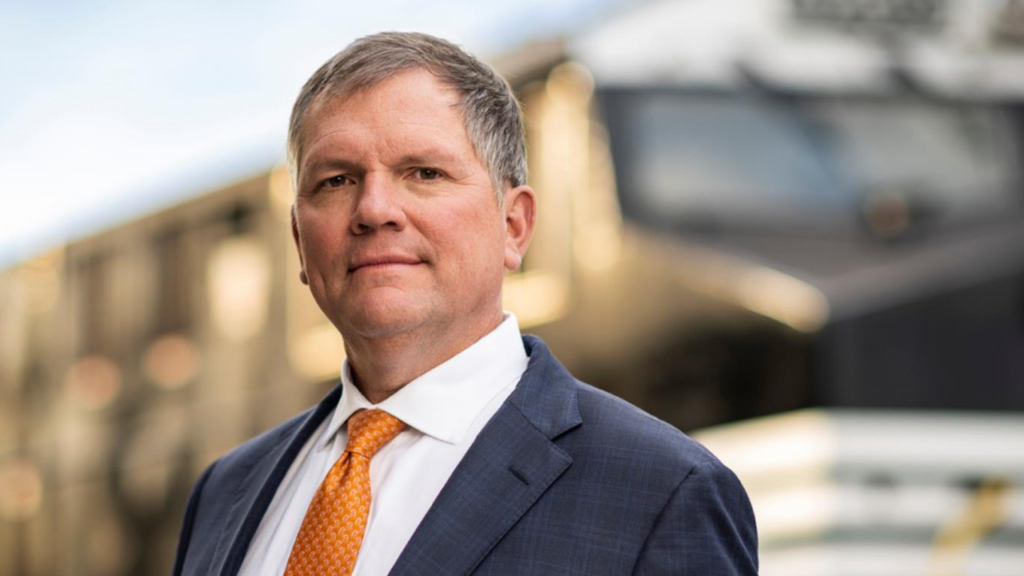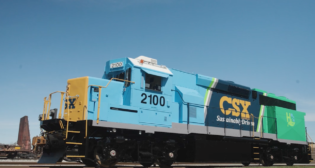
NS’s Shaw: ‘We Won’t Be Finished Until We Make It Right’
Written by Marybeth Luczak, Executive Editor
“We are working around the clock to remediate the remaining issues in East Palestine. We continue to listen to the experts and cooperate with state, federal, and local government agencies. We are committed to this for as long as necessary.” —NS, via Twitter on March 9. (NS Photograph)
Ahead of a March 9 Senate hearing on Protecting Public Health in the Wake of the Norfolk Southern (NS) Derailment and Chemical Release in East Palestine, Ohio, NS President and CEO Alan H. Shaw has released his testimony, detailing the Class I’s “commitment to making it right” in East Palestine and the region, progress on environmental remediation, and the railroad’s focus on safety. “Financial assistance is just a down payment,” according to Shaw. “I am going to see this through.”

Railway Age reproduces below Shaw’s full testimony as provided to the U.S. Senate Committee on Environmental and Public Works:
Chairman [Tom] Carper [D-Del.], Ranking Member [Shelley Moore] Capito [R-W.Va.], and distinguished members of the Committee, thank you for the opportunity to appear today to discuss the train derailment in East Palestine, Ohio. My name is Alan Shaw, and I have been the President and CEO of Norfolk Southern since May 2022. I look forward today to sharing our progress cleaning the derailment site, assisting families whose lives were disrupted, investing in the community, and making Norfolk Southern and the railroad industry safer. I am deeply sorry for the impact this derailment has had on the people of East Palestine and surrounding communities, and I am determined to make it right.
We will clean the site safely, thoroughly, and with urgency. We are making progress every day. Working now under the U.S. Environmental Protection Agency’s recent Unilateral Administrative Order, we have submitted a long-term removal plan that will guide our comprehensive testing program for the community’s water, air, and soil. That testing is guided by science, and we will continue to share the results transparently. The Ohio and U.S. Environmental Protection Agencies, as well as other local agencies, are continually monitoring the air and water quality in East Palestine and report that both the air and water are safe.
Financial assistance cannot change what happened, but it is an important part of doing the right thing. To date, we have committed to reimbursements and investments of more than $20 million in total, including by helping more than 4,200 families through our Family Assistance Center located in East Palestine. Supporting first responders has been a particular area of focus, and our contributions include more than $3 million to assist the East Palestine Fire Department. I would like to express again my profound admiration for the first responders from Ohio, Pennsylvania, and West Virginia who responded to the derailment.
I want to be clear: this financial assistance is just a down payment. I’ve met with community leaders, business owners, school officials, clergy, and others to begin to identify ways we can invest in the future prosperity of East Palestine and support the long-term needs of its people. We will continue to invest in East Palestine for as long as it takes to help the community recover and thrive.
We are also committed to learning from this accident and working with public officials and the industry to make railroads even safer. In the meantime, we have already launched a series of immediate steps to enhance safety, based on the facts in the National Transportation Safety Board’s preliminary report. We look forward to cooperating with the NTSB as it continues its investigation into the root cause of the accident as well as its wider investigation.
I. Our Commitment to Remediation and Monitoring
I have visited the East Palestine area frequently since the accident. I’ve met with residents of the community. I’ve heard their concerns, and I understand why they are worried. Their feedback has informed our approach. Norfolk Southern is working around the clock to remediate the remaining issues and monitor for any impact on public health and the environment. We continue to work in close coordination with federal, state, and local governments and others to conduct environmental monitoring and to develop and carry out near- and longer-term clean-up activities. The remediation plan and each step of our longer-term efforts will be implemented at the direction of the U.S. EPA pursuant to the Agency’s Unilateral Administrative Order.
Norfolk Southern specialists remain on-scene, assisted by multiple derailment and environmental contractors. These teams have contained, diverted, and treated affected portions of nearby waterways, have flushed nearly a mile of surface waterways, and are capturing rainwater within the contaminated areas for temporary storage and disposal. To date, we have recovered and transported more than 3.5 million gallons of potentially affected water from the site for disposal at EPA-approved facilities.
We also are working to safely remove affected soil, and our crews have removed more than 2,300 tons from the site. We have removed waste to landfills specifically engineered and permitted to safely handle this type of material. Our work will continue until the job is done.
To date, monitoring of East Palestine’s public drinking water and private water wells by multiple state and local authorities and Norfolk Southern shows that the water is safe to drink and there are no harmful levels of substances related to the derailment. Beginning immediately after the derailment and now at the direction of the U.S. EPA, we have implemented a comprehensive testing program to monitor the quality of the community’s air. The U.S. EPA has monitored air near schools and residential areas, in several government buildings, upwind of the derailment site, and downwind of the derailment area. Norfolk Southern’s outdoor air monitoring program has collected millions of data points from around the derailment site and throughout the community. The results of these tests continue to demonstrate that the air is safe to breathe. In addition, in consultation with the U.S. EPA, we have been performing indoor air quality screening for residents. To date, nearly 600 homes have been screened; none of the results indicate a health risk from incident-related substances.
We continue to listen to the experts and cooperate with state, federal, and local government agencies. We are committed to this monitoring for as long as necessary. We have also created a website, NSMakingItRight.com, to provide the latest information to residents of East Palestine and the surrounding communities.
II. Our Commitment to the Community
I want the people of East Palestine and the surrounding communities to know that Norfolk Southern and I are deeply committed to them and their recovery. To date, we have invested more than $13 million as a down payment and provided support to more than 4,200 families through our Family Assistance Center in East Palestine, including:
- More than $3 million in reimbursements and support to the East Palestine Fire Department for fire equipment used in the derailment response;
- A $1 million fund available immediately to community leaders to identify where donations can do the most good;
- Another $1 million fund to support the immediate needs of the community, overseen by a Norfolk Southern craft railroader who lives in East Palestine and has been hired to serve as a community liaison, reporting directly to my office;
- $300,000 to the East Palestine City School District to support the district’s academics, athletics, extracurricular activities, and long-term contingency planning regarding the impacts of the derailment;
- Funding and coordination of cleaning and air monitoring services for the East Palestine Elementary and High Schools; and
- $65,000 to the East Palestine Youth Sports Association to allow children to play in sports leagues for free for the year.
We have committed another $7.5 million in financial assistance to reimburse Pennsylvania emergency responders and health and environmental agencies for costs related to the derailment. And I personally have committed almost $450,000 to fund scholarships for seniors at East Palestine High School.
In addition to the nearly 200 Norfolk Southern employees and contractors who have been in East Palestine to help with remediation and financial assistance, we also have many employee volunteers who have come to the community to help. To offer just one example of how they are finding ways big and small to make a difference, our new community liaison recently observed that a local flower shop missed out on one of its biggest sales days of the year, Valentine’s Day, due to the disruption caused by the derailment. He ordered 100 bouquets of flowers from the shop and, with the help of our volunteers, distributed them to residents at a local assisted living community. That is the Norfolk Southern culture in action, and I could not be prouder.
Again, this is a down payment. I am going to see this through. There are no strings attached to our assistance—if residents have a concern, we want them to come talk to us. I understand how much East Palestine means to each resident, and we are committed to making this right.
III. Our Focus on Safety
We are committed to making the rail industry safer. We will analyze and address the NTSB’s investigation results when they are available, but we are not waiting to act.
The NTSB’s preliminary report released last month reflected that the Norfolk Southern crew was operating the train within our protocols and below the speed limit. The sensors in place to identify overheated axles operated properly, and the crew took the appropriate action when they received the alert. We currently spend $1 billion a year on technologies, equipment, and infrastructure to enhance safety. But the safety mechanisms in place did not prevent this accident, so we are focused on learning from this incident and working with industry to make changes.
The morning after the derailment, I spoke to NTSB Chair Jennifer Homendy and pledged the full cooperation of Norfolk Southern in the NTSB’s investigation. Chair Homendy has said publicly that the derailment occurred at the twenty-third car, a hopper car, with a particular focus on a catastrophic failure of the wheel bearing on this car. This car carried plastic pellets, and it was the combination of those pellets and a hot axle that appear to have started the fire. Neither Norfolk Southern nor the other Class I railroads own plastic-pellet hopper cars. That’s one reason why an industry-wide comprehensive approach, including railcar owners, car manufacturers, leasing companies, equipment makers, and the railroad companies, is essential to help improve safety as the rail industry continues to provide the logistical infrastructure that enables the United States’ economy to grow. It’s going to take all of us—and we’re eager to lead that effort.
As an initial step—and focusing on what we can do on our own—we are making our network of early-warning sensors stronger. Shortly after the derailment, I instructed my team to immediately look at steps we can take to improve safety further, and we are taking the following actions:
- Enhancing the hot bearing detector network;
- Piloting next-generation hot bearing detectors;
- Deploying more acoustic bearing detectors;
- Accelerating our Digital Train Inspection program; and
- Analyzing—with others in the industry—available data for patterns that could provide earlier warnings of potential safety issues, and partnering with other railroads to review best practices, including how the industry should respond to high-temperature alarms.
An essential part of our effort to make Norfolk Southern an even safer company is to further strengthen our safety culture. To describe how we are doing that, I would like to provide some important context on the new strategy we announced for Norfolk Southern at the end of last year. In a significant departure from the railroad industry’s recent past, we deliberately moved away from a singular focus on operating ratio, which is a common industry measure of efficiency. Instead, we are taking a more balanced approach to service, productivity, and growth.
As just one example of what our strategy means in practice, instead of furloughing workers during periodic economic downturns, we intend to use the opportunity to invest in our workforce and provide additional training. When we do that, it makes us a more resilient company that is better able to serve our customers, and it creates more career opportunities for our craft railroaders. We hired craft railroaders aggressively throughout 2022 and continue to do so this year.
Our new strategy goes hand-in-hand with our intensified focus on culture and employee engagement, with an emphasis on transparency and collaboration. I know that when Norfolk Southern is successful, it is because our craft colleagues are getting the job done for our customers and the U.S. economy. I have spent countless hours in the field in the 10 months I have served as CEO, thanking our front-line railroaders for their service and listening to their ideas on how to make Norfolk Southern better.
When we completed the recent round of national labor negotiations, with a historic and well-deserved 24 percent pay increase, I committed immediately to begin negotiations at the local level on quality-of-life issues like paid sick leave. We did what we said we were going to do and have already reached agreements on paid sick leave with three of our unions.
IV. Our Commitment to Industry Action
We are working with others in the industry in moving forward. All seven Class 1 railroads recently announced that we will join the Federal Railroad Administration’s (FRA) Confidential Close Call Reporting System (C3RS). Norfolk Southern was already actively participating in the C3RS Working Group that is part of the Department of Transportation’s Railroad Safety Advisory Committee. With all Class 1 carriers joining the FRA’s program, Norfolk Southern is building upon its own long-standing Close Call Experience Program.
And we believe it is important that we leverage Norfolk Southern’s data, as well as data from industry partners, to reevaluate alarm threshold temperatures for bearing heat sensors. Norfolk Southern’s wayside detectors trigger an alarm at a temperature threshold that is among the lowest in the rail industry. Our wayside heat detectors are regularly inspected every 30 days and are spaced more closely than many others in the industry. We are also exploring new technologies and refinements to current systems.
V. Conclusion
Finally, Chairman Carper, Senator Capito and members of the Committee, I want to state again how deeply sorry we are for the impact of this derailment on East Palestine, surrounding communities and all of the people who have been affected. We are making progress in the recovery and know our work is not yet done. On behalf of the more than 19,700 hard-working employees of Norfolk Southern, I pledge that we won’t be finished until we make it right. Thank you for the opportunity to testify before you today, and I look forward to your questions.
________________________________________________________________________
Also scheduled to be providing testimony are Debra Shore, Regional Administrator, U.S. Environmental Protection Agency, Region V; Anne Vogel, Director, Ohio Environmental Protection Agency; Richard Harrison, Executive Director and Chief Engineer, Ohio River Valley Water Sanitation Commission; and Eric Brewer, Director and Chief of Hazardous Materials Response, Beaver County Department of Emergency Services.
Further Reading:
NTSB Issues Preliminary Report on NS Ohio Derailment
East Palestine: NTSB Examining Tank Car Hatch Covers
AAR: Class I’s On Board With C3RS; FRA Data Points to ‘Strong Safety Record’
USDOT Marks ‘Significant Progress’ on Key Rail Safety Reforms Following NS Ohio Derailment
Norfolk Southern Outlines New Six-Point Safety Plan
NTSB: ‘Special Investigation’ of NS
FRA: Supplemental Safety Assessment of NS Operations
AAR Outlines Key Class I Safety Actions
NS to Establish Ohio Training Center, Expand OAR Program



